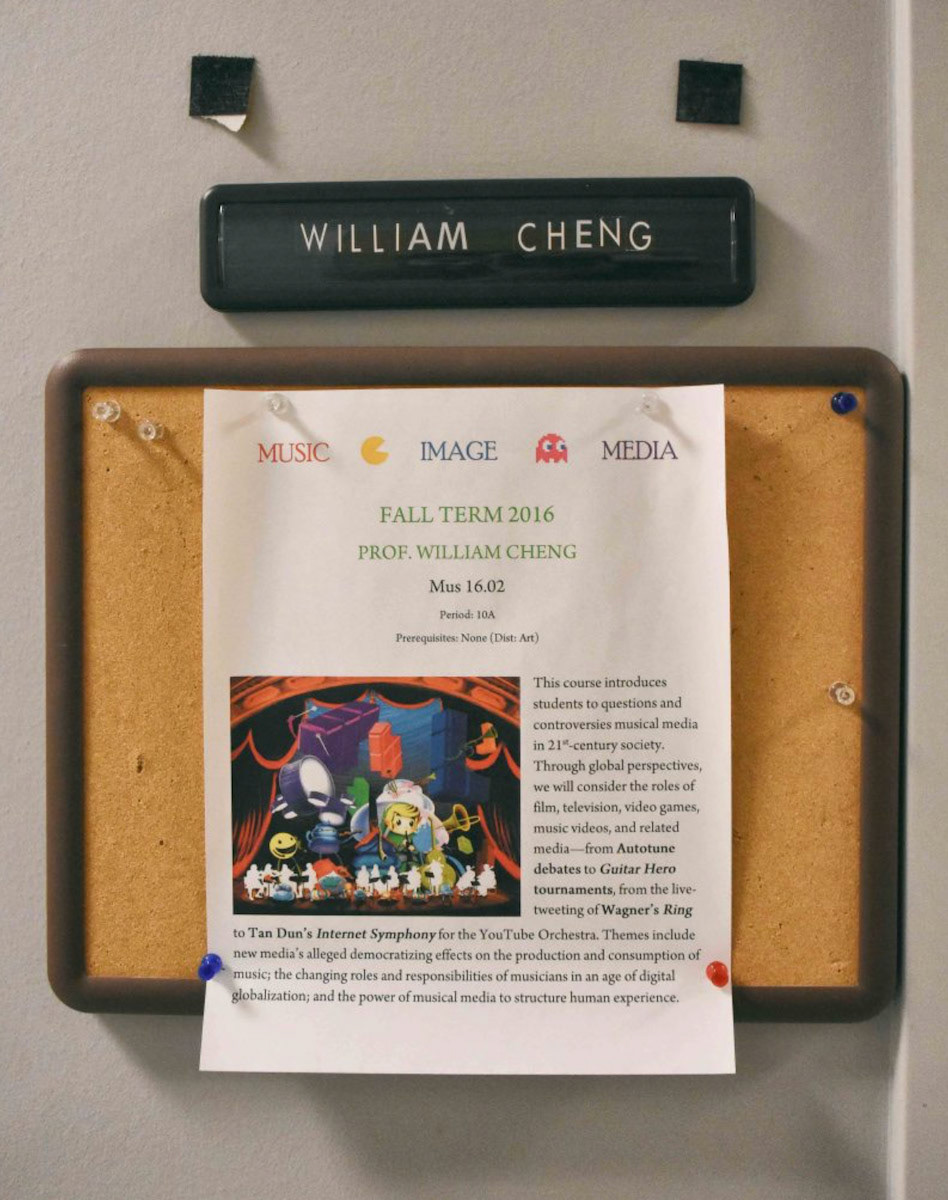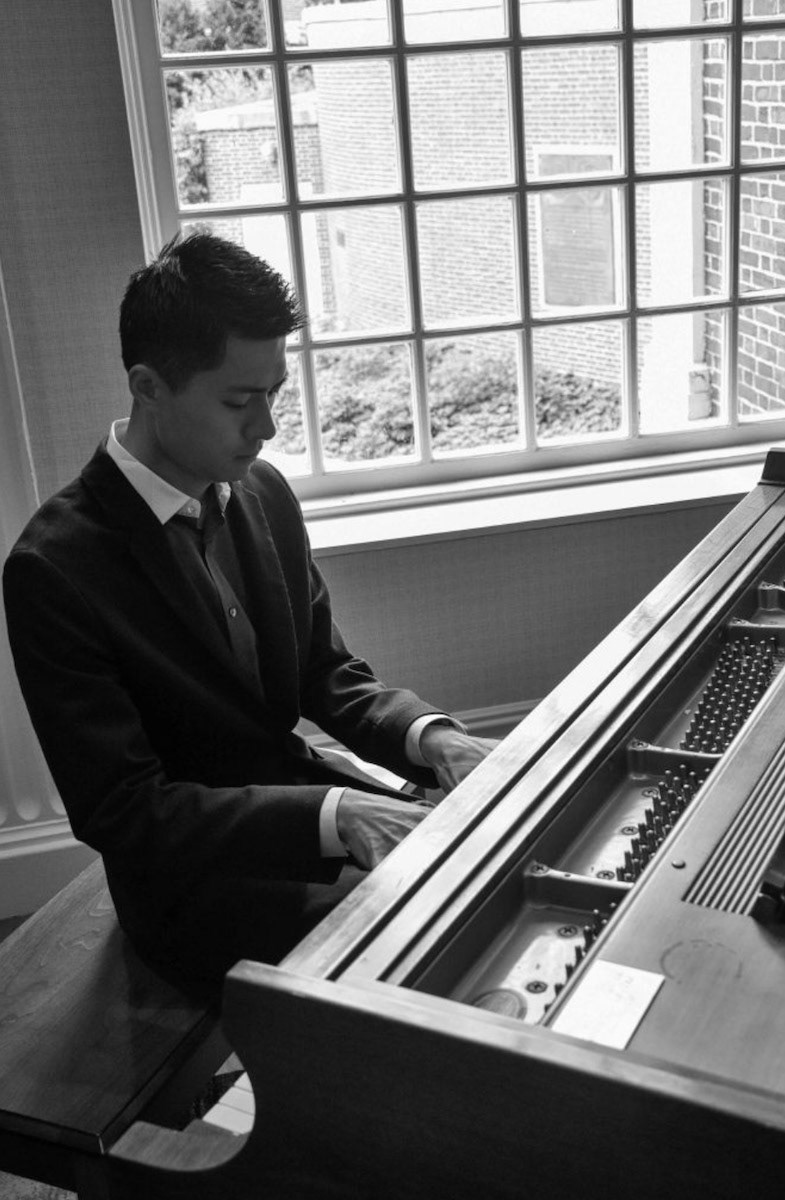Just Vibrations: The Purpose of Sounding Good is not your typical musical monograph. The second book from 31-year-old William Cheng, Assistant Professor of Music at Dartmouth College, doesn't dwell much on Bach, Beethoven, or Brahms, nor does it offer extensive analysis of an opera, chamber work, or symphony. It doesn't pore over early church music or the experimental pieces of 20th-century composers. Instead, Cheng sets his sights on the fields of musicology and related disciplines, calling upon their practitioners to reflect on the actual labor of scholarship and on their interactions with others in the academy. The book proposes that musicologists, in cultivating sensitive ears and careful listening practices, may be ideally situated to bring compassion and empathy back to the ivory tower, a realm in which the hyper-competitive, publish-or-perish pursuit of career advancement often trumps considerations of interpersonal care.
Born out of Cheng's experiences with severe chronic pain, Just Vibrations is nuanced and wide-ranging. It weaves confessional accounts and pop culture illustrations with sophisticated ideas from multiple disciplines, yet the writing is remarkably clear and full of hope. Cheng favors prose that is readily accessible to a wide audience, and he is a committed public intellectual, with recent articles in Time, The Washington Post, Pacific Standard, Slate, and Huffington Post. We spoke with Cheng about the origins of his book, its ambitious goals, and the fierce opposition it has already provoked from certain corners of the musical and musicological community.
What motivated you to write Just Vibrations?
I’d love to claim this book had some cool genesis, like I was out walking in the forest one day and heard songbirds, and thought to myself, “Wow, aren’t those just fabulous vibrations!” But I’m no Snow White; on a good day, maybe somewhere between Dopey and Doc. The true story is far from a fairy tale. In 2013, I developed a chronic pain condition that frequently kept me housebound and bedridden. I was periodically passing out from pain and malnourishment, getting taken to the ER, and seeing doctors who expressed confusion or outright skepticism. I couldn’t write and could barely read. Pain meds exacerbated the mental fog. For at least a year, I kept the illness a secret from everyone except family. I was worried that if colleagues found out, they would see me as damaged goods: unpredictable, unreliable, unemployable. At the same time, I wanted to scream from the rooftops and out myself as ill, just so I wouldn’t have to keep making up excuses for backing out of conferences or for simply declining a coffee date. Even—or especially—in this hyperconnected age of social media, so many of us struggle privately, whether with physical pain or depression or so-called invisible disabilities. And through these last few years, what I’ve needed most has been care, broadly speaking. I craved the compassionate ears of colleagues and physicians. I longed to be heard—heard not as a writer or an academic specifically, but as a vulnerable, striving person who’s more than the sum of sickness. Out of this came Just Vibrations, a modest plea for care-oriented scholarship.
Can you outline the key arguments presented in the book?
The book advocates for a practice of musicology that places care, empathy, and compassion at the core—rather than at the extracurricular fringes—of daily pursuits. In academia, care can seem queer: it’s a sentimental outlier, an odd duckling in traditional labor environments that reward intellectual rigor, individual resilience, and meritocratic mentalities. Competition is the name of the game, per the very definition of game. I envision an alternative ethos that underscores collaborative and reparative scholarship. Doing well and doing good are complementary ideals.
Musicians and musicologists are extremely proficient at demonstrating care toward music: we cherish beautiful notes, their meanings, the things they let us feel and say. This is wonderful. All I’m suggesting is that we channel more of this attentive devotion toward colleagues and strangers as well. Does our ear-training in musicianship classes improve our ability and willingness to listen caringly to people? When we teach students to confront sounds that, to their ears, might at first resemble noise—an Expressionist symphony, or Stockhausen, or Japanoise—should we simultaneously be teaching them how to listen to, say, queer protesters or Black Lives Matter demonstrators whose voices have often likewise been dismissed by their critics as mere noise, as just vibrations?
I love the title, Just Vibrations. As you demonstrate throughout the book, aural phenomena (such as speech, music, and noise) are never “just” vibrations—they are always already more than mere sounds. Your work also raises ethical questions about how we might produce—and listen for—“just” vibrations in our everyday lives and about what it means to “sound good.” Can you talk further about how insights and ideas drawn from musicology might be brought to bear upon problems in the field of ethics?
This interest came out of my first book, Sound Play, on the musical cultures surrounding video games. In parts of that book, I interviewed players who commit sound-based offenses in online multiplayer gameworlds: for example, players annoying others by blasting bagpipes in The Lord of the Rings Online, or players using voice-chat to harass others in Team Fortress 2. The offenders would often claim immunity by saying that it’s all just sound, just a game (hence the soundness—safety—of sound play).
In our physical environments, it can likewise be easy to conceive of sound as invisible, intangible, ephemeral. Not until the stakes are palpably raised—such as cases of sonic disturbances, or worse, sonic weaponization—do we tend to care whether particular sounds are just or unjust, ethical or unethical.
The book centers around questions of care, compassion, and empathy, not just in musicology but within academia more broadly. I imagine there are scholars who will dismiss these concerns outright as “soft” and not worthy of critical consideration. Why do you believe the time has come for academia to start reckoning with these issues?
Academia has reckoned with these issues for ages. Technological advances may have raised the stakes and changed the playing field. With social media these days, there’s an illusion of democratized expression: the idea is that anyone can say anything and get away with it. But not everyone has equal access to such technologies (for reasons of income, geography, ability-accessibility, and disposable time), and people have varying senses of security and expressive freedom.
Soft gets a bad rap in professions that seem to demand tough skin and shiny armor and steel wills and disciplinary brick walls. Soft discourse can be a hard sell for academics. In Just Vibrations, I explore oppositions between discourses that are purportedly soft versus hard, high versus low, strong versus weak, and so on. None of these, I stress, should be taken as either-or. Counterpoint is more productive.
What does “care-oriented musicology” actually look like in the real world? That is, how are you practicing what you preach in everyday life—in the classroom, in your interactions with colleagues at Dartmouth and at professional conferences?
”The example I’m about to give may indeed sound soft and cheesy. One thing I do in each of my courses is to seize on the first extended moment of awkward silence, which might happen when I ask an open-ended question. During this inaugural hush, I’ll tell them to take a beat and to listen to the silence. I say something along the lines of, “This silence doesn’t have to mean what you think it means. It doesn’t mean you don’t have answers. It just means we’re all deep in thought, we process information at different rates, we all have insecurities, and we may fear whether others will listen respectfully if and whenever we do choose to speak.” And my hope is for the silence to fill up with an alternate texture, capable of representing more than some collective deficit or a game of verbal chicken. If we teach Cage’s 4’33’’ in certain courses, why not put some of its provocations into practice?
Patience is one of the things I’m practicing in everyday life. Sometimes this takes the form of what we might call plausible compassion: recognizing that anyone—everyone—might be going through tough times, even if they don’t show it, or even if they’re being a jerk towards you. After each of my surgeries, there would be months where I’d rehab by walking slowly outdoors—not so slow that I looked obviously disabled, but slow enough that people brushing past me might cast a confused, even annoyed, glance. I mean, I was walking upright, and I looked normalish, so why be a slowpoke? Didn’t I have places to go? That’s what the cocked heads and wrinkled eyes of certain passersby conveyed. And all I could think was: if only you knew. Because we don’t know what’s going on with most of the people around us. And although we don’t have to stop and listen to everyone else’s stories, the least we can do is practice a bit more benefit of the doubt.
As for conferences and life at Dartmouth, I’m sociable and outgoing to the best of my abilities. That said, I’m pretty sure I’m an introvert, since my idea of a good time is usually a one-on-one coffee, catching up with a friend or meeting a new colleague.
In the introduction to Just Vibrations. you state, “I aim to renovate the Ivory Tower’s architecture so as to shelter those who most need it.” You certainly make some radical moves towards indicting academia’s status quo, both through the form and the content of your book. You also employ a wide range of examples and illustrations drawn from pop culture, as well as confessional passages, in a work that actively resists (or, rather, seeks to expand) the traditional confines of scholarship. For an untenured junior faculty member, isn’t it a risky move to publish a book of this nature?
I think it’s risky to publish any book of any nature, because anything we write exposes us to the big world of critics. Following the book’s ideals, I’ve been trying to think less in terms of whether I have sufficient academic freedom via tenure, and more in terms of whether I have some kind of academic responsibility irrespectiveof tenure. If Just Vibrations were to cause the eventual denial of my tenure, I would be okay with that so long as the book ends up doing some good for our professions and conversations. Incidentally, Just Vibrations started out as a short article, which was rejected in rapid succession by three academic journals. After the third rejection, I was ready to throw in the towel. Then one of these journal editors—who had already politely declined the article—suggested that I “extend this into a Contemplating Music for the new century.” I don’t know if I can fill such big shoes, but I was enlivened to get back on the horse.
How has your book been received thus far?
Next question! Just kidding. It has been a learning experience. In terms of private correspondence, I’ve had people email me and share thoughts in confidence: stories of personal illness, discrimination, transphobia, depression, sexual assault, and the temptation to leave academia. We go back and forth swapping stories, offering shoulders to lean on, finding ways forward. It’s mutual care and vulnerable trust on an intimate scale.
Responses on public forums have been a different beast. There’s been clamor on Norman Lebrecht’s classical music blog Slippedisc. Lebrecht’s readers take issue with the book on multiple fronts, though most of them claim—quite proudly—that they haven’t read the book and never intend to, which I guess is their prerogative. So first, they have a problem with the trailblazing feminist musicologist Susan McClary, who wrote the foreword for Just Vibrations. Second, some commenters keep complaining that the book is “neo-Marxist” and “postmodern.” I admit I had to look “neo-Marxism” up on Wikipedia. As for “postmodern,” that’s a weird accusation. There are several parts of Just Vibrations that explicitly advocate for accessible writing and critique the opacity of certain styles of academic rhetoric. I increasingly find that some people today say “postmodern” to mean “whatever I don’t agree with” or “whatever I won’t deign to read.” Or as Inigo Montoya tells Vizzini in The Princess Bride, “You keep using that word. I do not think it means what you think it means!”
And lastly, the Lebrecht commenters seem to think I’m proposing a competitive model of “intellectually rigorous scholarship” versus “care-oriented scholarship.” That’s the farthest thing from what I wish. One can care about music and people, about professional advancement and compassionate conduct. These practices are complementary and mutually accountable. So consider this comment on the Lebrecht blog, someone who asked (in response to an excerpt from the book regarding the responsibility of professors to address how, for example, their female students might not be able to work late in a library because they don’t feel safe walking back home at night): “If you’re so concerned about the safety of female students, then why are you a musicologist? Why aren’t you a policeman or a rape counselor?” The if-then here is dangerous beyond belief. Its fallacious logic sums up why greater theorization and practices of care are sorely needed in the academy and beyond. I mean, what is this person implying? And what does this say about what people think musicologists do and don’t do?





How have you responded to critiques of the book?
I’ve responded publicly on only a couple of occasions. When someone on Lebrecht’s blog accused me of being an “honorary feminist,” I defended myself as a “feminist, period.” It’s cheeky, I know. Yet if Barack Obama, a sitting president, can openly identify as the F-word, then the rest of us have no excuse. Then, on an email list, I pointed out how trolling—a phenomenon I’d studied during my video game ethnographies—isn’t always as innocuous as it sounds. And I’ve had quite unpleasant private email exchanges with various skeptics, such as people who haven’t read the book but hold strong opinions about what they think the book should be about. Finally, some friends have gotten hate mail just for defending me. This collateral damage saddens me more than any personal attack. The book is, in a nutshell, recommending care and love, and yet hateful responses abound anyway. To be clear, I’m not trying to take away anyone’s love of Beethoven, just as Hillary Clinton is not coming to take away people’s fucking guns. But somehow, a message that deviates from music appreciation can come across, to some ears, as outright threatening.
How did Susan McClary come to write the foreword for the book?
We shared a cab from the airport to the hotel during the last American Musicological Society conference in Louisville, and we got to chatting about this book in progress. I later shared my manuscript with Susan, and my editor Mary Francis extended an official invitation. Susan was so gracious to accept and went on to write her generous and heartfelt foreword.
Writing a book that weaves intimate autobiographical accounts with complex theoretical considerations must have involved a great deal of self-reflection and introspection.
Did you experience any significant moments of self-discovery during the writing process?
It’s reorganized my priorities. I didn’t take very good care of myself throughout college or grad school. I mentally brute-forced my way through coursework and research, and in the process, let matters of wellbeing fall by the wayside.
This project emerged, in part, from a deeply personal experience of chronic pain and suffering, yet the text, at times, rings with hope. What keeps you optimistic about the future of musicology and about the wider enterprise of academia?
My optimism might be a bias because I’ve learned to surround myself with supportive, caring people—and why not? Life’s too short. In addition, I’m seeing how so many college and grad students across disciplines these days are committed to issues of justice. Their activism gives me hope.
In addition to the standard hardcover, paperback, and Kindle editions of the book, you’ve offered the entire text online, free to the public, via Open Access. Why did you decide to publish the book this way? Did you have a hard time convincing University of Michigan Press to allow free public access on the web?
Mary Francis and I came to the decision together, and from there, it was a matter of securing financial support. I was fortunate to obtain the necessary funds through a handful of grants and by waiving author royalties. Since Just Vibrations advocates for care and accessibility, it made sense to render the book as accessible as possible. Open Access means anyone can read the book online, regardless of income, professional status, employment, or institutional affiliation. The online version also allows for text-to-speech software to assist readers with sight impairments.
What are you currently working on?
I spent this summer working on myself! Following the most recent surgery, I’ve been going to therapy and physiotherapy, and trying new meds. A work in progress, as are we all. On the writing front, I’m completing books called Meritopia and Touching Pitch, and coediting a volume titled Queering the Field. I’m really excited about these projects.
Is there anything else that you’d like to share about Just Vibrations?
I feel like this is the part where I need to thank people, even though I’ve done so in the book’s acknowledgments! Truly, though, this book wouldn’t exist had I not sought—and found—the support I’ve needed over the last several years. Good care kept me here.
Follow Professor Cheng on Twitter(@willxcheng) and read more about his research on his website and Academia.edu page. Just Vibrationsis available for purchase here. Read the entire text online via Open Access.
About the Author/Photographer:
James Napoli is the founder of Junction Magazine. James has since moved to Minnesota and all content is managed by a collective of artists. Read more about them here.
